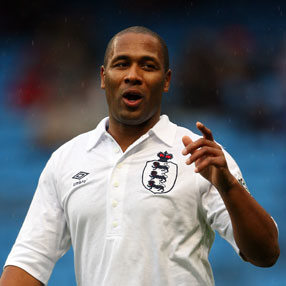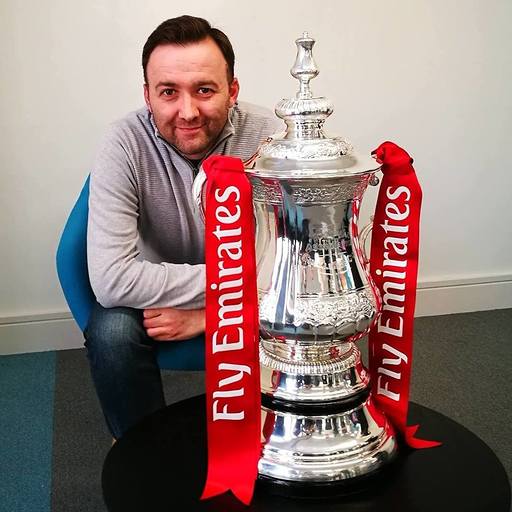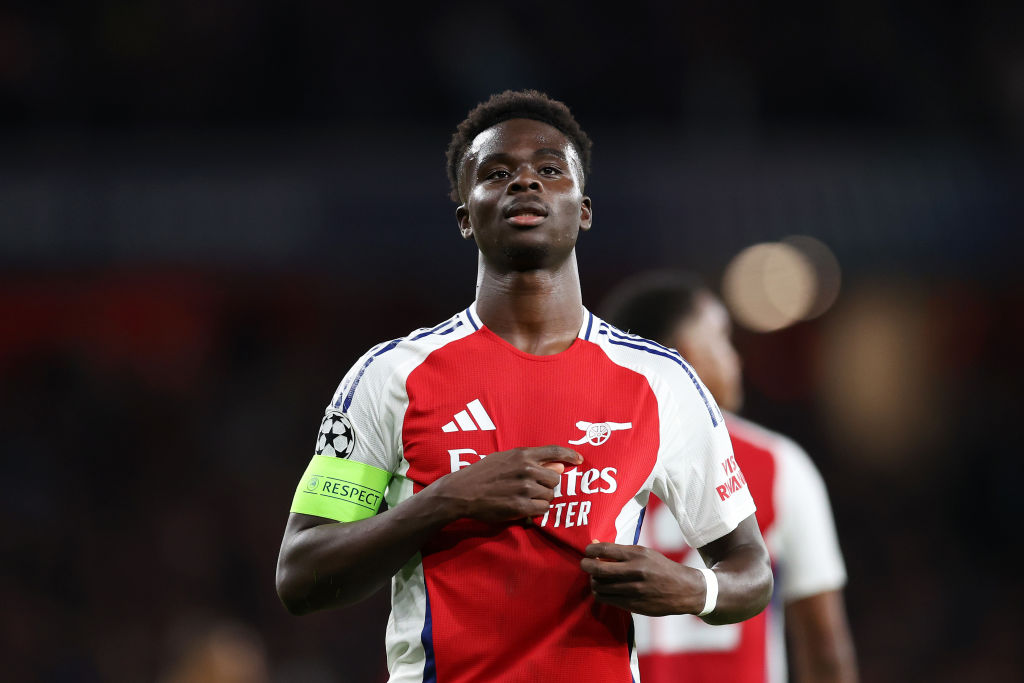Les Ferdinand: One-on-One
"I’d travel up in the helicopter on the Monday, stay all week and fly back on the weekend..."

You grew up in West London, where I can imagine there weren’t too many Leslies. Did you ever get any lip at school for your name?
Darren Green, Chorley
Well, I was bigger than most lads in school, so no. The only other Leslie I knew was a girl I fancied but there weren’t any other guys named Leslie. Besides, people just called me Les.
Who were your heroes growing up?
Brian Grey, Eastleigh
The late Laurie Cunningham, Cyrille Regis and Brendon Batson were the first black players I saw on TV who I could relate to. Seeing them play for West Brom was a real inspiration. It was nice for me that I started out with Hayes, the same club Cyrille Regis started with.
How is it that a player of your ability was playing non-league until you were 21? Is it harder for players to take that route now?
Glenda Friar, Warwick
I actually signed for QPR when I was 19, but I think it was a case of being in the right place at the right time. I’d never had trials, and in fact, for the first three years I played for my school football team, I played in goal.
But it is harder for non-league players to come through now.
I think this is down not only to the managers but the fans, too: they demand that clubs spend millions on players. They want an immediate impact. The average manager’s lifespan is something like 13 months now, so why would he sign a player if he might not be around when that player’s ready for the first team?
Did the fans really sacrifice a sheep in your honour in Turkey?
Andrew Clarke, Hull
It wasn’t in my honour. The team sacrifice a sheep every year, it’s supposed to bring them luck. But that wasn’t the only weird thing. At the start of every season, all the key players would get a dove, which they had to release in a ceremony on the pitch. When it got to my turn, I ran to the centre circle with this dove in my hands, and in front of a full stadium I threw it into the air.
But instead of flying away, it crashed straight back down. So they signalled for me to do it again and this time I threw it really high up, but the same thing happened. So this old fella comes running up, pulls the wings out and then I threw it up again and this time it flew away. As I was doing it, I thought I was gonna get lynched for jinxing the team.
In 1992-93 you helped QPR to sixth in the table, to the surprise of many people. What was the key to your success?
Dave Cummings, Darlington
I think Gerry Francis got the combinations right – we had the right players in the right positions. Everyone was comfortable on the ball. We had players like Ray Wilkins, Ian Holloway, Alan McDonald and Clive Wilson, all of whom could play.
Did you feel pressure when you joined Newcastle? After all, you were replacing the prolific Andy Cole...
Reese Havers, Burnley
When I joined Newcastle I said that all I can do is be Les Ferdinand. I knew if I could be myself, I would score goals. Kevin Keegan told me that he was going to put a team together that would allow me to score and he did, so I didn’t feel any pressure.
Newcastle’s players were notorious pranksters. Which was the best prank?
Ross Jenkins, Worthing
It wasn’t a prank, but it was a really funny situation. One year we had a fancy dress party but en route, we stopped in this big square in Newcastle for a kickabout. People started watching and all they saw was the likes of Fred Flintstone (Steve Watson), Barney Rubble (Lee Clark) and me as Count Dracula having a kickabout. It must have looked surreal. It was only after a while when someone shouted, “Oi! That’s Les Ferdinand!” that people recognised us.
How much did the arriv�al of Tino Asprilla destabilise your championship bid?
Heather Lee, Yeovil
To blame Asprilla for what went on is ludicrous. He was an asset. The team hadn’t been playing well and Kevin noticed that we were starting to let it slip so he wanted to bring someone in to bolster the side. At the start of the season I had a supply line of David Ginola and Keith Gillespie which helped me score 20 goals up until Christmas. When Asprilla came in, our style of play changed. Keith Gillespie wasn’t playing anymore so everything started coming down the left. Opposing teams knew this, so they’d double up on David Ginola. That’s why the goals dried up.
What did the players make of Keegan’s “I’D LOVE IT...” interview?
James Silcock, Hartlepool
We all laughed. I saw it on the news so I called Warren Barton and we were both cracking up. But that didn’t affect our title bid. What affected our bid was not having any tactics. Our motto was ‘If you score two, we’ll score three.’ In the second half of the season that didn’t work.
When you look back now, are you amazed at the way Man United cut back your lead to win the title? Was there a specific point when things started to go wrong?
Will Widdecome, Bournemouth
It wasn’t about Man United pulling it back – it was about us losing it. When we started losing games, there wasn’t much of an inquest into what happened. I think it boiled down to the fact that, apart from Peter Beardsley, no one in the team had experience of what it takes to win the title.
At Newcastle, you learnt how to play the saxophone, ride a motorbike and fly a helicopter. How did you find time to train?
Douglas Sparrow, Chingford
I learnt how to play the sax myself but the motorbike I learnt with Warren Barton. The first day we did our CVT we went out on the road, and Warren had bought open- faced helmets. So we were riding down this road and we stopped at the lights outside this pub when all of a sudden all these Newcastle fans in their replica shirts run out and start shouting, “Oi Ferdinand, get off that bike, you better not get injured”. The helicopter lessons started when a guy from a local flying school phoned me and asked if I was interested in lessons and I said yes. Although I kept it quiet from the club.
I heard you and Tino Asprilla used to jam together: you on the sax and Tino on the drums. What was your favourite tune?
Robin James, Southall
Unfortunately, that’s not true. Tino was a legend on the drums though. Every time he’d have a party, after a few drinks he’d break out the bongos and go for it.
Sir John Hall said he had no intention of selling you, then flogged you to Spurs a couple of days later. Did you feel betrayed?
Bertie Focas, Luton
I kind of knew. I’d heard that Spurs, Everton and Sheffield Wednesday had made a bid but Kenny Dalglish told me that he’d back my corner. In the end they said it was a financial decision. I’d scored 50 goals in two seasons so I was disappointed.
You were competing for an England spot with Alan Shearer, Teddy Sheringham, Ian Wright, Robbie Fowler and Andy Cole and Chris Sutton. Why are there so few top-class English forwards today?
Daniel Hemmings, Belfast
...Stan Collymore, Matt Le Tissier. I think in recent years, everyone wants to be like a Teddy – they all want to play off the centre-forward. Someone like Marcus Bent has got all the attributes to be a top class centre-forward but he wants to play in that deep-lying role. People just don’t want to be out and out centre-forwards anymore.
I recently read that you’re 5ft 11in and couldn’t believe it. I thought you’d be much taller for such a great header of the ball. How did you learn to hang for so long?
Kate Miles, Macclesfield
I’m 5ft 11 and three quarters! I don’t think it was something I learned, I was born with it. I used to play against defenders who were 6ft 3 and I’d make it my mission to outjump them – and I would. I just had the ability to anticipate when to jump, and a lot of the time I’d get up early. I was an admirer was Michael Jordan. He had a spring on him!
How did a Spurs team that included you, Klinsman, Ginola, Sol Campbell and Darren Anderton struggle so badly?
James Bryant, Kirby
Injuries. Loss of form. You mentioned a few players but for a team to be strong, all the players have to be strong, physically and mentally. I was at Spurs for seven years and in my first five years I had five managers and in my sixth year we had a change of board. I think there was a lot of instability and that was part of the problem.
Towards the end of your career, you were relegated with West Ham and Leicester in consecutive seasons. Were your team-mates worried that you’d make it a hat-trick when you joined Bolton?
Kian Irving, Maidstone
I’d never been relegated in my whole career, but I took a chance by going to West Ham and it didn’t work out. Then I went to Leicester. I could have gone to Southampton, but because I lived just off the M1, I joined Leicester because it meant I didn’t have to move. If I’d moved house and joined Saints, I wouldn’t have got relegated twice.
It is true you used to commute to Bolton from London via helicopter? Are you not concerned about your carbon footprint?
Martin Deacon, Fife
It’s not like everyone thinks. Most people thought I’d travel up every day but I’d travel up in the helicopter on the Monday then stay there all week and fly back on the weekend. At the time there wasn’t that much talk about carbon footprints, but now there is, hence me selling my helicopter.
Get FourFourTwo Newsletter
The best features, fun and footballing quizzes, straight to your inbox every week.
Who’s the best player you’ve played with?
Ashley Adams, Greenwich
Paul Gascoigne was exceptional, as was David Ginola. Roy Wegerley was also a fantastic player. When I was at QPR, he scored a goal against Leeds that won Goal of the Season. I’ve never seen anyone go past players as easily as he did. But because, at the time, he was close to being the best footballer in the world, I’d probably say Paul Gascoigne.
Who was the toughest defender you ever faced?
Patrick Hunt, Bushey
Probably Tony Adams. Whenever I came up against a defender I’d assess where I could beat them. If he was good in the air, I’d think that my pace in behind would give me the edge. If he was quick, chances were, I could probably out jump him. But Tony Adams would drop off and get himself into position where it was difficult to beat him either in the air or on the ground. Also, my era of playing against Tony Adams was when the defenders were allowed to come through the back of you. And Tony Adams was never shy of coming through the back of you. When the laws changed to stop the tackle from behind, at first, defenders where allowed one bite of the cherry before being booked. As a forward, when the ball was coming towards you, you would stand there thinking, ‘Here it comes.’ Soon as he’d tackled you from behind, he’d get up, point to Steve Bould and say, ‘Now it’s your turn.’
You scored the 10,000th goal in Premiership history, but which was your best?
Rupert Holland, Hereford
I scored a thirty yarder against Manchester United for QPR - that’s one that always springs to mind. I’ll always remember my first goal for Newcastle, which was against Coventry. The free-kick I scored against Oldham for QPR is also up there.
You played until the ripe old age of 38. What’s your secret to staying young? Early nights? Cucumber face-packs? Lots of sex? Seriously though, you’ve had in incredibly long playing career. What’s been the highlight?
Alan Tierney, Reading
Desire to play was what kept me going. When I was 28, I always said that if I’d played in the Premiership until I was 33, I’d have had a good career, but I played until 38. In that time, I guess the highlight was playing for England. That was something I’d always dreamed of, and when it happened, it felt great.
Gregg Davies is the Chief Sub Editor of FourFourTwo magazine, joining the team in January 2008 and spending seven years working on the website. He supports non-league behemoths Hereford and commentates on Bulls matches for Radio Hereford FC. His passions include chocolate hobnobs and attempting to shoehorn Ronnie Radford into any office conversation.

